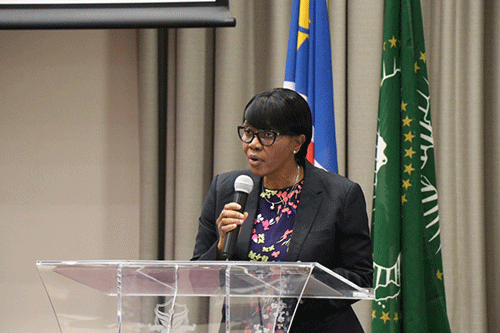– receives 120 corruption complaints
– declines 63 cases
The Anti-Corruption Commission has introduced new measures to tighten the noose on loopholes in the system to curb corruption in public and private entities.
The anti-graft yardstick, which was recently launched by ACC deputy director general Erna van der Merwe, seeks to prevent corruption through examining practices, systems and procedures to determine the veracity of corruption in the country.
This will be done through identifying loopholes and arming institutions with corruption prevention tools.
The ACC will also keep a close eye on funds involving political parties, particularly how they fund their campaigns.
This is to ensure that transparency and accountability is complied with.
ACC must verify whether political parties are providing the requisite financial statements and disclosing their source of funding.
This comes at a time when two of the country’s biggest political parties – Swapo and the Popular Democratic Movement – have been found wanting, as far as their finances are concerned.
Swapo is accused of diverting public monies from the fishing industry through the Fishrot scandal to finance its internal and national election campaigns.
PDM, on the other hand, is accused of using its earning from the National Assembly to pay back individual loans and remunerating some of its politicians who are already on the public payroll.
More so, asset declaration has also been identified as a key factor in combating graft in both in the public and private sectors.
The ACC will “identify irregularities in [the] declaration of import and export goods, irregularities in tax assessment raised and verify life style audit” reports.
This is in a bid to prevent illicit enrichment.
The commission will monitor capital projects closely to ensure they detect possible inflation of prices, examine the probability of bribery and identify delays.
The new measures come at the back of 120 complaints of corruption during the 2020/2021 financial year, a decrease from the 187 complaints received the previous year.
According to ACC’s 2020/2021 annual report, only 50 of these cases warranted investigation compared to 61 cases that were investigated in the previous year.
These figures do not include matters in which whistleblowers were directed or advised to report complaints to other relevant institutions.
“The remaining 63 cases of non-pursuable corruption complaints were declined due to insufficient evidence or vague or unsubstantiated information provided, while seven corruption related cases were referred to other institutions with a request for feedback.
The nature of information for the corruption cases received determines whether the matter warrants investigation by the ACC or not,” the 2020/21 report noted.
Out of the 120 cases reported, 73 were closed due to unsubstantiated or declined evidence, insufficient evidence to ensure investigation, and/or vague information.
Another reason cases were closed was because they were referred to the relevant authorities with requests for feedback.
The commonly reported types of corruption cases included abuse of power, tender irregularities, irregularities in recruitment, bribery, abuse of public resources and land tax refunds.
Abuse of power made up 20% of the corruption cases, which were mainly reported by whistle blowers. Cases related to tenders and procurement made up 10% of the cases.
The ACC head office in Windhoek recorded the highest number of corruption cases totalling 60, followed by Erongo with 22 and Oshana with 20.
Otjozondjupa recorded the lowest number of cases at 18.
The head office serves the Khomas, Hardap, //Kharas and Omaheke regions, while the Erongo office also serves Kunene. The Otjozondjupa office also serves Kavango East and West and the Zambezi region, while the Oshana office serves Omusati, Ohangwena and Oshikoto.
According to the report, the year under review was challenging due to the Covid-19 pandemic, which led to officials in several offices working from home, making it difficult to investigate and finalise dockets speedily.
-Additional reporting by Nampa



